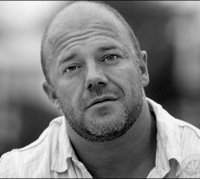
On his bio page, Andrew Sullivan felt it necessary to tell visitors where he attended grammar school, where he applied as an intern in 1986, and the subject of his first article for The New Republic — “the cult of bodybuilding.”
There is a self-congratulatory element to anyone’s bio. Nonetheless, this sentence struck me as self-aggrandizement on Sullivan's part:
In the early 1990s, Sullivan became known for being openly homosexual, and for pioneering such issues as gays in the military and same-sex marriage.Sullivan has helped significantly to raise the visibility of these two issues, but his use of the term “pioneering” seems to gloss over the courageous efforts of people who laid much of the legal, cultural and political groundwork many years earlier.
Consider the issue of same-sex marriage, for example:
* In 1970, when Sullivan was only seven years old, a Minnesota couple — Jack Baker and Mike McConnell — had the courage to walk into a county courthouse and submit forms for a marriage license. Their effort led to this legal decision by the Minnesota Supreme Court.
* Also in 1970, Rita Hauser, the U.S. representative to the United Nations’ Human Rights Commission, gave a speech supporting the proposed Equal Rights Amendment even as she noted that the ERA would allow same-sex couples to marry.
* In 1973, a group of gay lawyers and activists form the Lambda Legal Defense Fund. Through the years, Lambda has offered legal assistance to gay couples seeking marital or other rights.
* In 1975, two gay men in Phoenix legally secured a marriage license and wed before the county attorney could file an injunction against them.
* In 1984, Berkeley, Calif. became the first U.S. city to enact a “domestic partner” law for its municipal employees. In 1991, Lotus became the first major company to grant domestic partner benefits to gay and lesbian employees. Domestic partner provisions did exactly what the Right feared they would do: they encouraged acceptance of same-sex relationships and set the stage for greater openness toward gay marriage.
The term "pioneer" more appropriately fits these people and groups. They were the first ones to fight, march, speak out, develop legal strategies and do the other things that blazed the trail that led to where we are today. These early efforts didn't gain traction legally, but they did help to organize a movement of activists and raise public consciousness.
Before people like Andrew Sullivan (or bloggers like me) had a platform from which to advocate same-sex marriage, the issue had to be seen by ordinary people as legitimate.
It became a legitimate issue only because the real pioneers in the 1970's and 80's were willing to advocate "gay marriage" at a time when speaking those two words, at best, elicited nervous giggles.
0 comments in Gay Marriage: The Real Pioneers
Post a Comment